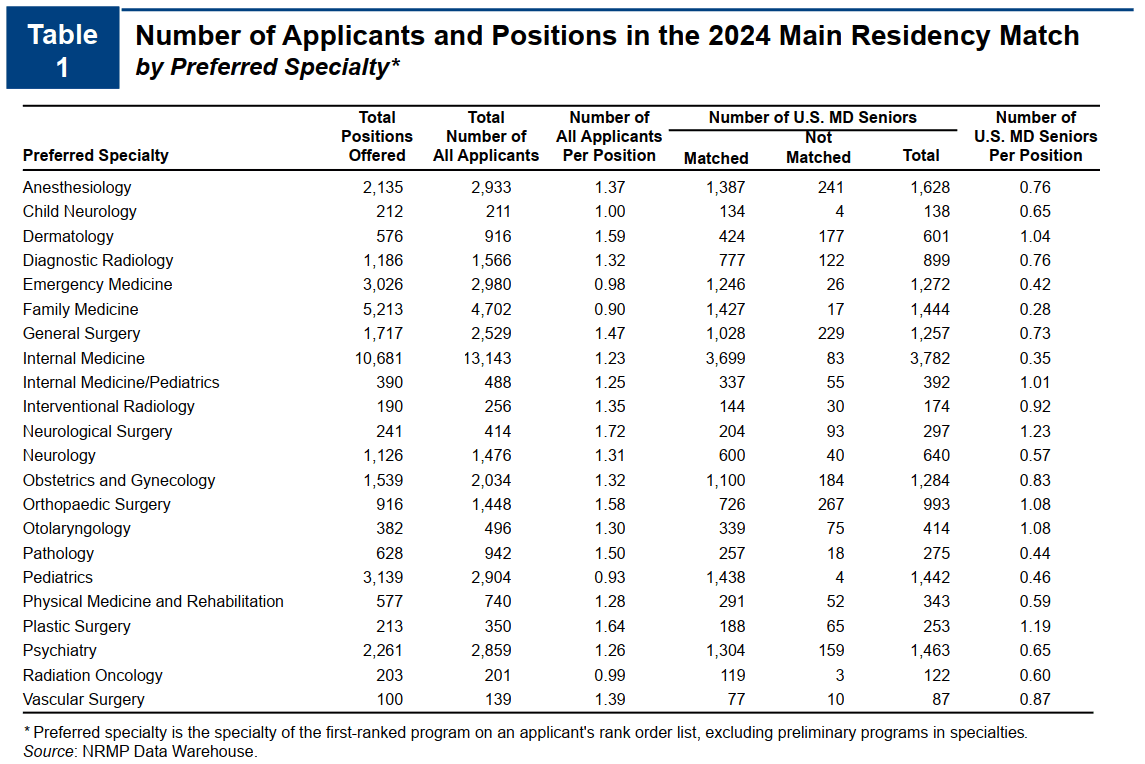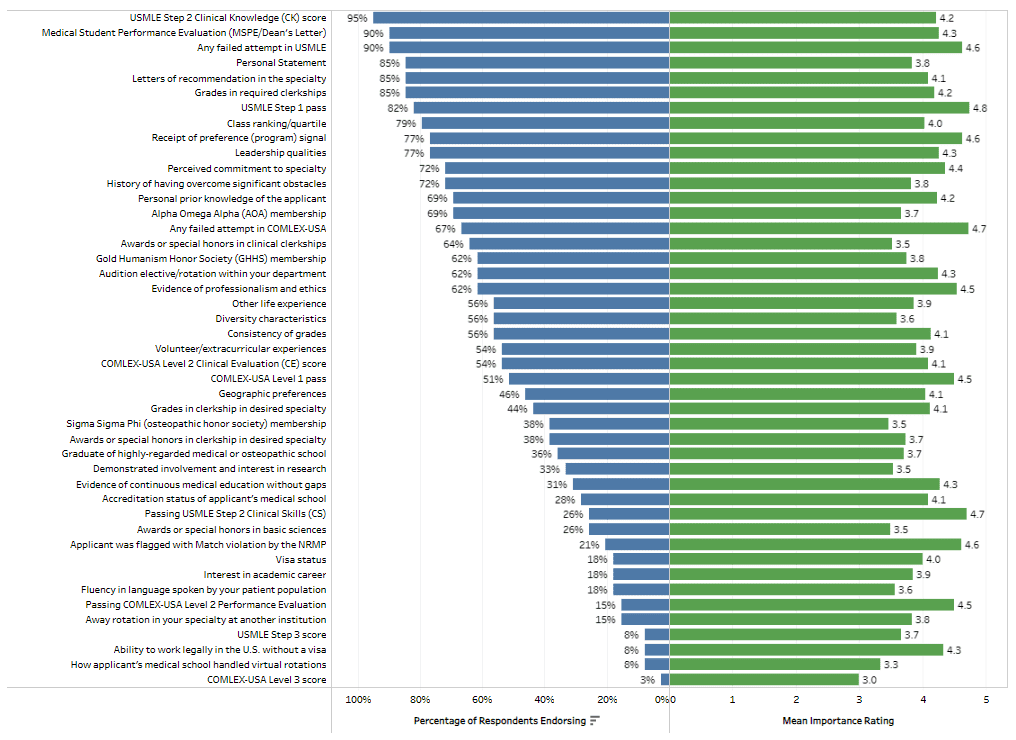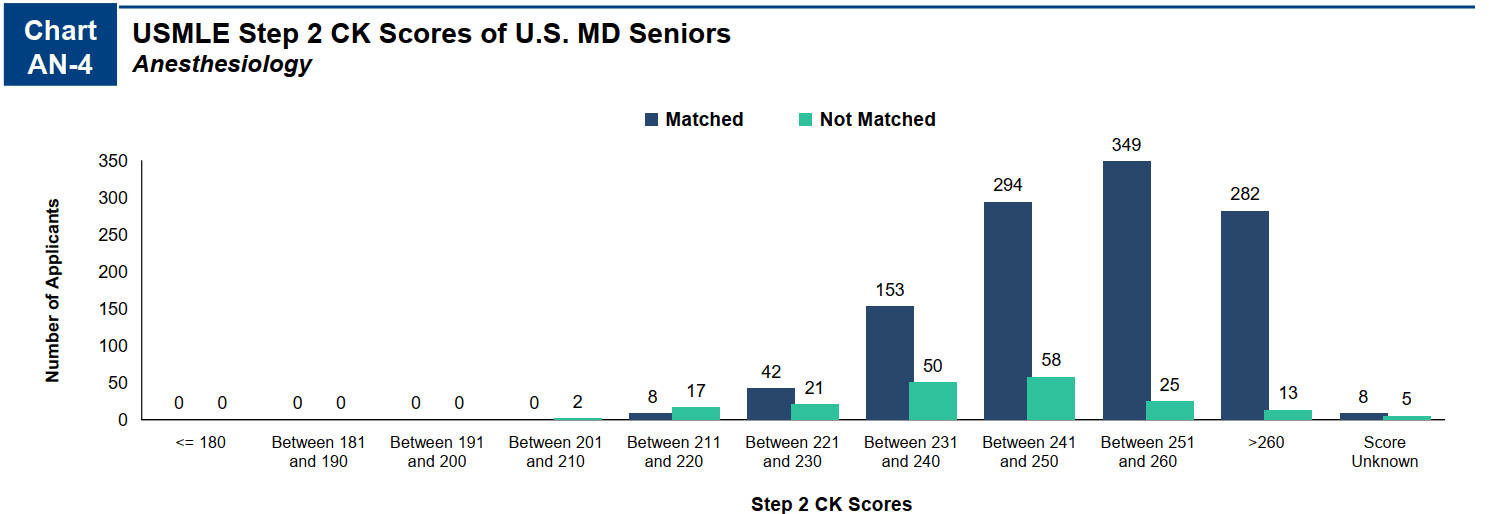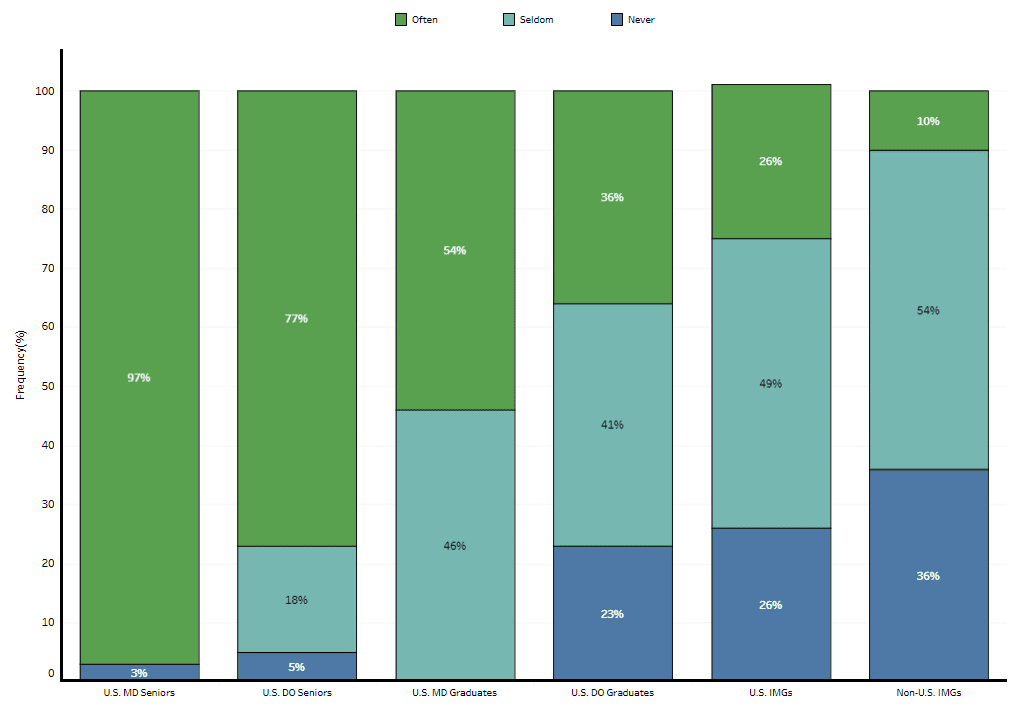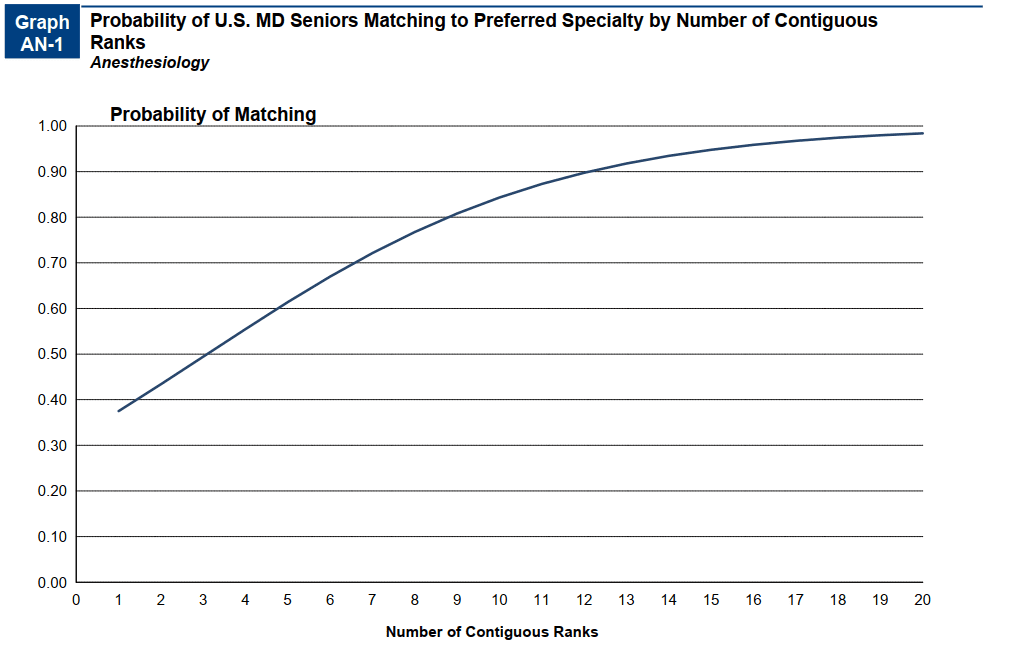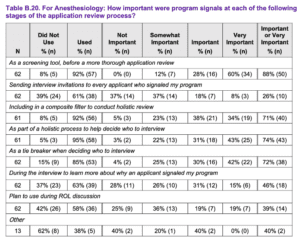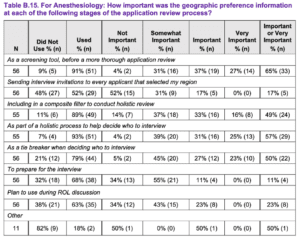How to Match into Anesthesiology for Residency

43171 Views
This blog was originally published on September 13th, 2019, and updated in August of 2024.
From A Program Director Viewpoint: What You Need to Match into an Anesthesiology Residency
With residency application season upon us, it’s crucial to understand what it takes to successfully match into an Anesthesiology Residency Program! The NRMP conducts a biennial survey to determine what factors Program Directors prioritize when evaluating candidates for their residency programs. The results of the latest survey, based on data from the 2024 match cycle, are summarized in an “at a glance” tool. This tool is invaluable for assessing where your application stands relative to the applicant pool and identifying areas for improvement, such as obtaining a strong letter of recommendation (LOR) or gaining additional clinical experience.
Given the recent changes in the residency application landscape, including the shift of Step 1 to a pass/fail score, it’s more important than ever to stay informed. This blog post will highlight the key takeaways from the 2024 survey and provide guidance on how to enhance your application to maximize your chances of matching into an anesthesiology residency. Make sure to check out our 2025 residency application timeline to keep on track during this competitive process.
How Competitive is Anesthesiology
Anesthesiology is considered a medium to highly competitive specialty to match into for medical residents in the United States. It attracts a considerable number of applicants due to its diverse and challenging nature, offering a combination of critical care medicine, pain management, and perioperative care.
Among other sources, the competitiveness of anesthesiology residency programs is reflected in the National Resident Matching Program (NRMP) match data. The match rate for anesthesiology has been consistently high, with more applicants than available positions in recent years. The following comes from the 2024 NRMP Match Data:
In 2024, there were a total of 2,933 applicants to fill approximately 2,135 positions in Anesthesiology. While the match rate for US MD Seniors was high (85.1% | 1,387 matched / 1,628 applied), the match rate for DO students (58.2%) and IMGs (46%) were significantly lower.
What are Program Directors Looking for?
How to Match into Anesthesiology for Residency: Getting an Interview Invitation
Program directors are receiving more applications than ever before. The following are the most critical components to getting your foot in the door and getting that interview. Based on the 2024 survey, the following are the most important factors.
To break things down a bit further regarding score importance for Anesthesia:
- Step 1 Score – As Step 1 is pass/fail, it’s not surprising that getting a passing score on Step 1 ranks highly on this list. Notably, not having a failed Step 1 attempt is tied with the MSPE letter at second place for percentage of respondents endorsing, and higher in mean importance.
- Step 2 Score – While passing Step 1 is important, Step 2 scores rank is the most important factor, now that Step 1 isn’t scored. According to the 2024 NRMP Charting Outcomes in the Match, the average Step 2 score for a candidate matching into Anesthesia is about 252.
- According to NRMP data, applicants whose Step 2 scores were below 220 were more likely to be refused than matched.
- More than 80% of applicants whose scores fell between 241-250 matched in 2024.
- Range programs DO typically offer interviews to students coming in at or above a Step 2 score of 240. 240+ seems to be the range at which you can feel comfortable being offered interviews by enough programs. If you’re in the 250+ range, you can likely be selective about where you apply.
What if I Failed USMLE Step 1 on My First Try or Am a Non-Traditional Applicant?
- Failing Step 1 MAY be a show-stopper
- As mentioned earlier, having a Step 1 fail was ranked as a top consideration when deciding which candidates to interview.
- In previous years, the NRMP survey included a question that addressed this directly. While it’s true that failing USMLE Step 1 is a BIG deal in ANY specialty, in the 2022 survey 2/3 of Anesthesia residency programs MAY still consider you if you’ve failed Step 1/Step 2. So, if you’ve failed an exam, you can still apply. But we HIGHLY recommend you apply to a big number (100+) of programs.
- Also, International Grads are a GO!
- 26% of programs routinely consider US IMGs and 26% never do. These stats are slightly less ideal than the average of all specialties, but still leave room for IMG applicants. We recommend casting a wide net and applying to many programs to help secure a spot. Also, consider applying to friendlier geographical areas, and checking the program’s current residents to try and determine whether they are IMG-friendly.
Interviews and Ranking When Applying to Anesthesiology:
- Interviewees Get Ranked!
- If you get an interview invitation, you’re likely to end up on the rank list if you choose to interview. We recommend making a rankings list of at least 12-20 programs. Once you have 15 interview invitations you can feel okay with prioritizing and canceling lower-priority interviews. The probability of matching for an average US MD Senior improves to >90% at about 12 contiguous ranks.
- Expect interview invitations from late-Sept to mid-Nov. If you’re falling short of 12-15 interviews by Thanksgiving, start reaching out to programs you are REALLY interested in to express interest in interviewing to beef up your rank list. However, if you didn’t send them a signal, you’ll have to justify your “newfound” interest. Read more about signals below.
- Expect to interview in Nov/Dec!
- For further discussion on how to prep for your interview see our blog post on How to Crush your Residency Interview.
New Features: Program Signals and Geographic Preferences
Watch our recorded residency roundtable on this topic here, or read on for more information.
Program Signals
One of the newer features of ERAS is program signals. These allow applicants the opportunity to express interest in individual residency programs. Signals are designed to help programs prioritize students for interviews.
Anesthesia is leveraging a tiered program system:
- Gold signals are designed to identify an applicant’s “most preferred” programs.
- Silver signals are designed to identify an applicant’s “preferred” programs.
For the 2023-2024 cycle, students are given 5 gold signals and 10 silver signals. Given the number of signals available to applicants, it’s important to use your signals wisely. Based on a 2022-2023 Program Director Survey to the Supplemental ERAS, 90% of Anesthesia programs used program signals during the application review process. I’ve copied Table 20 and Table 21 from the survey below for additional insights. You can see that 92% of program directors used program signals to help screen applicants.
How Will This Differ from Past Years?
In the past, if a student didn’t receive an interview from a program, they could follow up to express interest. However, if you’re going to reach out to a program that you did not send a signal to requesting an interview, you should probably have a pretty good reason as to why you now have a strong interest in their program whereas before they were not in your “top 15.” See below from Table 23 in the survey.
If you’re a very competitive applicant, using signals is quite simple: send them to the programs you are most interested in. However, if you’re a less competitive applicant, the use of signals can become a bit more nuanced. If you use all of your signals at reach programs and are not offered any interviews, it may be more challenging to get interviews at programs in which you are more competitive. For these situations, I highly recommend discussing with one of our Anesthesia Residency Advisors.
Geographic Preference
Anesthesia applicants also have the opportunity to identify their geographic preferences. For the vast majority of applicants, there is no need to try to game the system. Just choose regions where you would like to end up for residency. For those that have no geographic preferences and are happy to train anywhere, you can select “No geographic preference.” Be aware, if you truly have no preference, it is important to select “No Geographic Preference.” Program directors can see what you’ve chosen IF you’ve listed the region in which they are located OR “no geographic preference.” However, if you select another region or don’t put down any preference, they will see the field left blank. As you can see from the ERAS 2022-2023 PD Survey, the difference between a blank field and “no geographic preference” response comes across very differently to PDs.
Supplemental ERAS® 2022-2023 Application Cycle: Results of the Program Director Reaction Survey
HIGHLY RECOMMEND: ACCRAC PODCAST
To hear an amazing discussion from actual program directors on this subject, I highly recommend listening to the following podcast episode from Dr. Jed Wolpaw, program director at Johns Hopkins along with Drs. Dutoit and Teeter to discuss the changes to the ERAS application system including program signals, geographic preferences, experiences, and general advice. If you’re interested in Anesthesia, the ACCRAC podcast is one of the best. However, no need to try to listen to all episodes before you start residency.
ACCRAC Podcast: Program Signals and Geographic Preferences
Summary of Anesthesiology Residency Applications:
- A solid anesthesia application would include a 240+ on Step 2, a LOR from an Anesthesiologist, and a strong MSPE.
- Be sure you leverage Program Signals and Geographic Preferences to your advantage
- Anesthesia seems relatively IMG-friendly, but we still recommend doing your homework, especially identifying programs with active IMG residents.
- If you’ve failed an exam, you can still apply in Anesthesia, but you should apply very broadly.
- Expect Interviews Late Sept-Mid Nov. Reach out to programs you have high interest in if you haven’t heard from them by Thanksgiving. Once you have about 15 interview invitations, you can start being picky about which ones you actually take.
Good Luck!
Wondering about your chances of matching into other specialties for residency? Check out our analysis of the NRMP directors survey “at a glance” tool for areas including neurology, dermatology, family medicine, transitional year, psychiatry, emergency medicine, and more under the Residency Applications category of our blog! If you need further or specialized assistance understanding which residency specialties you are best suited to apply to, you can contact us or visit our residency advising page to learn more about how Elite Medical Prep residency advising services.
For reference, the full interactive table tool can be found here: https://www.nrmp.org/match-data-analytics/interactive-tools/at-a-glance-program-director-survey/
For more residency matching assistance, consider enlisting the help of an Elite Medical Prep residency advisor! Schedule your complimentary consultation to learn more.
Featured Articles

